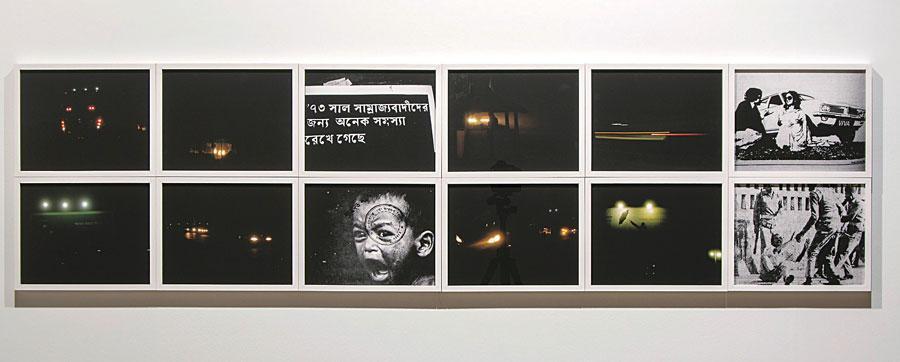
Artist and historian Naeem Mohaiemen’s films, installations, and essays analyze the formation and collapse of the Third World internationalism through Bangladesh’s complicated postcolonial journey, focusing on three ruptures — the 1905 partition of Bengal within British India, the 1947 partition of British India into India and Pakistan, and the 1971 war that split East and West Pakistan into today’s Bangladesh and Pakistan. At the margins of these turbulent events were interlinked leftist uprisings in other parts of the world during the 1970s.
Using newsreel footage and found photographs as well as contemporary re-stagings, Mohaiemen examines why the idea of a socialist “utopia” in postcolonial nations has faded, replaced by hyper-capital desires and pious politics. Drawn from family narratives, popular culture, and national mythology, the works reveal anonymous and recognizable protagonists moving from the early 1950s to the 1970s, always reflecting the role of unreliable memory in both official and informal histories.
“Prisoners of Correct History,” which opened at SALT Beyoğlu on Jan. 23, is influenced by Mohaiemen’s ideas about the possibility of the cultural institution as pages of a transnational history book.
Centering the work of human memory, the artist problematizes the Bengali term “shothik itihash,” translated as “correct history.” He assembles a narrative by piecing together a number of shared myths — a missing can of film, a wrong man, and a censored document — to tell stories of loss and failure, with a glimmer of hope, and also caution about future politics. The audience is left to question whether the protagonists are the commanders or prisoners of state-controlled historiography.
The exhibition spreads across two floors as well as to the Walk-in Cinema, where “Tripoli Cancelled” (2017), a fable about a man who lives in a non-place, will be screened at programmed times. Starting on the third floor, the film “United Red Army” (2011) and accompanying “United Red Army: Timeline” (1968-1977) (2012) examine a moment when the “willing stage” of the Third World hit back, refracted through the Japanese Red Army’s hazy attachment to the Palestinian cause. You Will Roam Like a Madwoman (2014) looks at a popular Bangladeshi magazine of the 1970s, mixing new patriotism, consumer feminism, and revolutionary 70s zeitgeist.
Intersecting with SALT Beyoğlu’s location on İstiklal Avenue, historically and politically charged as a site for demonstrations, “My Mobile Weighs A Ton” (2008) and “Live True Life or Die Trying” (2009) address the function of photography, new technologies, and coded language within student protests taking place in Bangladesh.
The artist’s questioning of the archive continues with “Abu Ammar is Coming” (2016), which explores a darker explanation for an iconic photograph of “foreign fighters in the PLO,” and “The Year 1973 Created Many Problems for the Imperialists” (2013).
The latter reflects on the misplaced optimism that imperialist forces had “finally gone too far” and would now face defeat, a theme Mohaiemen returns to in “Two Meetings and a Funeral” (2017).
In “Rankin Street 1953, Blueprints” (2013), the artist reconstructs a family home fallen to the forces of aggressive capital that have erased an old city and extended family form.
The installation, “Kazi in Nomansland” (2008), excavates the poet Kazi Nazrul Islam, who is the only person to appear on the stamps of all three of Salman Rushdie’s “Midnight’s Children”—India, Pakistan, and Bangladesh—revealing a shared, and disputed, national history after the partition of British India.
Programmed by Farah Aksoy from SALT, the exhibition expands on the concepts presented at a 2014 survey exhibition at Kunsthalle Basel.
Naeem Mohaiemen
Born in London in 1969, Naeem Mohaiemen works in Dhaka and New York. He was one of four finalists for the 2018 Turner Prize, along with Forensic Architecture, Luke Willis Thompson, and the winner Charlotte Prodger.
He is a member of the ICA Independent Film Council and a 2014 Guggenheim Fellow.